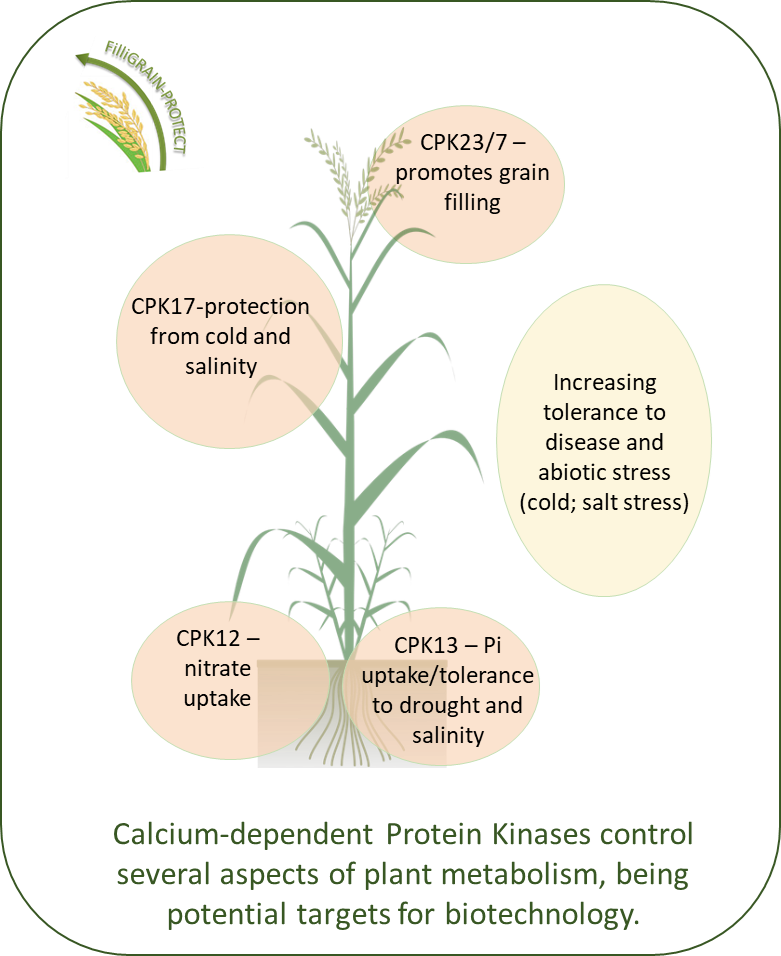Adverse climate events have become increasingly unpredictable, leading to significant crop production losses and food insecurity in vulnerable regions around the world. To protect biodiversity, it is crucial to focus on increasing yields and reducing stress-related losses through resilient and productive crops.
FilliGRAIN-PROTECT is a Fundação para a Ciência e a Tecnologia (FCT) funded scientific project (https://doi.org/10.54499/PTDC/ASP-PLA/1920/2021) that aims to address these challenges by developing biotechnological tools to protect rice grain filling under stressful conditions. By doing so, FilliGRAIN-PROTECT contributes to achieving United Nations Sustainable Development Goals 2 (zero hunger) and 15 (stop biodiversity loss).
Rice (Oryza sativa L.) has been chosen as the focal crop for this project for its importance as a source of nutrients, feeding over 50% of the world’s population, and its significant social and economic impact in Portugal. Additionally, rice serves as an excellent model for genetic and physiological studies that can be extrapolated to other important cereals such as maize and wheat.
Stress and metabolic signaling networks are fundamental to plant stress responses, enabling plants to adapt to environmental changes. Specifically, calcium-dependent protein kinases (CDPKs) play a crucial role in this process. They interpret calcium signals triggered by environmental shifts and elicit cellular responses by phosphorylating downstream targets.
The FilliGRAIN-PROTECT team has extensively studied the involvement of CDPKs in the regulation of rice metabolism, including cold and salinity stress responses, as well as nutrient uptake.

What we know:
OsCPK17: involved in the acclimation of rice to cold and salt stresses
OsCPK13: confers tolerance to cold and salt stresses and controls Pi uptake
OsCPK23 and OsCPK7: regulate starch synthesis and respond to cold stress, and can be targeted to increase skin strength in the grain
Moving forward, the main goals of FilliGRAIN-PROTECT are as follows:
- Create proof-of-concept genetically modified (GMO) rice plants that protect grain filling under cold and salt stress conditions by increasing the production of the four CDPK genes of interest.
- Explore the genetic diversity of rice in the Portuguese Rice Germplasm Bank to identify potential parental sources with increased expression levels of the CDPKs to use in breeding programs as a non-GMO alternative.
- Uncover the biotechnological potential of CDPKs and their regulators using advanced techniques like mass spectrometry and yeast-based screening to identify the specific targets and elements involved in these processes.
- Validate the function of the CDPK genes through comprehensive tests assessing the observable traits.
Task 1: Creating of rice lines overexpressing of the selected CDPK-genes
ITQB, Task Leader: NS and IA
Task 2: Exploring biodiversity for CPDK-enhanced expression
INIAV, Task leader: AA
Task 5: Standardizing stress assays and phenotyping
ITQB, Task leader: AF
Task 3: Identifying and validating TFs that regulate OsCPK7/23 expression
ITQB, Task leader: NS
Task 5: Identifying interactors and phosphotargets of CDPKs
ITQB, Task leader: IA
- Biotechnological tools to support rice breeding programs
- Standard Stress Assays
- Knowledge Creation with Description of Novel Stress Response Pathways
- One Patent
- Two PhD Thesis
- Two Msc Thesis
InForma Program (task 6)
- School Program
- For adults
- Simple scientific articles reviewed by students and aimed at younger audiences
For Peers
- School Program
- For adults
- Simple scientific articles reviewed by students and aimed at younger audiences

